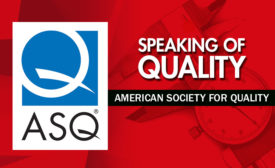Home » continuous improvement
Articles Tagged with ''continuous improvement''
The fourth industrial revolution, or Industry 4.0, and what to do to get engaged with Quality 4.0, began in 2011.
Read More
Face of Quality | Jim L. Smith
Pursue Excellence
Change the culture to make continuous improvement a way of life.
March 5, 2021
Avoid Disappointment
Plan encouragement and acknowledgement of your people.
February 10, 2021
Leading Amid Turmoil: Quality Leadership 2021
Excellence in quality is never a small feat. This year, it was even bigger.
February 10, 2021
Sponsored Content
White Paper: Using Business Analytics to Rebound & Succeed on Product Quality
Learn how Business Intelligence can be the catalyst to help your organization rebound and excel on quality during the second half of 2020.
August 18, 2020
Stay in the know with Quality’s comprehensive coverage of
the manufacturing and metrology industries.
eNewsletter | Website | eMagazine
JOIN TODAY!Copyright ©2025. All Rights Reserved BNP Media.
Design, CMS, Hosting & Web Development :: ePublishing









